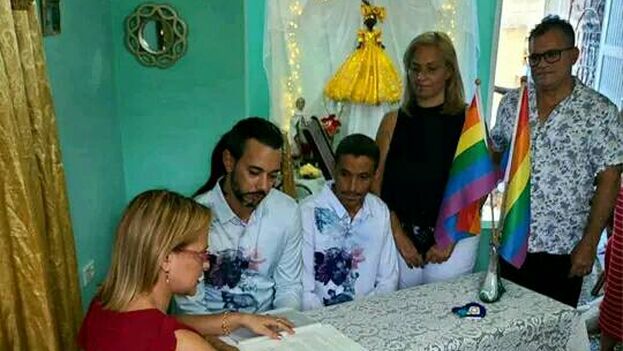
![]() 14ymedio, Havana, 6 October 2022 — On Tuesday, seven days after the entry into force of the Family Code, what may be the first wedding between two people of the same sex in Cuba was celebrated. Alberto and José, two young people from Manzanillo, Granma, got married on Tuesday after 18 years of civil union.
14ymedio, Havana, 6 October 2022 — On Tuesday, seven days after the entry into force of the Family Code, what may be the first wedding between two people of the same sex in Cuba was celebrated. Alberto and José, two young people from Manzanillo, Granma, got married on Tuesday after 18 years of civil union.
The news was disseminated on Facebook by the EntreDiversidades page, which shared the report of Roberto Mesa Martos, a journalist for the provincial newspaper La Demajagua.
According to the reporter, one of the spouses, José, expressed his “happiness at realizing a dream I’ve cherished for years.” “I never thought they were going to approve it here but we always wanted it,” said the other spouse, Alberto.
The ceremony was held at the couple’s home with family and friends of the newlyweds.
“They seal in this way a process that now offers them responsibilities in the face of any situation of the spouses, the legal support of common acquired property and the rights of food and care,” Mesa said.
The Family Code, which authorizes same-sex marriages, was approved in a referendum on September 25 and entered into force two days later, after the provisional results were announced on Monday.
This Tuesday, a week later, the National Electoral Council (CEN) of Cuba disseminated “the final results,” very similar to those already known.
Final results showed “Yes” slightly lower, going from 68.87% to 66.85%. “No” did not grow to the same extent, from 33.13% to 33.15%. Meanwhile, abstentions rose from 25.01% to 25.88%. The consolidated data delve into the number of those who didn’t go to the polls, the highest since 1959.
The president of CEN, Alina Balseiro, communicated the figures at a press conference in which she alluded to the “total transparency” of the process and the “total attachment to the truth” of the organization, although in her comments she added surprising statements in a State without separation of powers.
The official said that the CEN is “an electoral” and “non-political” body of an “independent” nature that “organizes, supervises and controls” the electoral process, but she had to defend herself before the international press for having published on Twitter a message from Cuba President Miguel Díaz-Canel, in which he asked voters to vote “Yes.” Balseiro argued that this didn’t affect the credibility of the organization.
“More than the ’Yes’ vote, I was promoting the dissemination of the process we were developing. And we did it with all conviction, and we will continue to do it. That doesn’t imply that our work doesn’t fulfill our duty and independence,” she rescued herself.
The census was updated, according to Balseiro, including new voters and recent deaths, which left a growth of 8,447,467 to 8,457,978. The register includes thousands of Cubans who have left recently, whom the Government still considers residents since the two-year period after which they will be excluded has not yet passed. It’s not known what effect on abstention those absentees could have had — very numerous, judging by the migration figures for the countries that are transit areas or more frequent destinations.
The Family Code, which replaces that of 1975, prohibits child marriage, authorizes “solidarity marriage,” contemplates sexist violence (absent from the new Criminal Code, however) and replaces the concept of parental authority with that of parental responsibility.
Translated by Regina Anavy
____________
COLLABORATE WITH OUR WORK: The 14ymedio team is committed to practicing serious journalism that reflects Cuba’s reality in all its depth. Thank you for joining us on this long journey. We invite you to continue supporting us by becoming a member of 14ymedio now. Together we can continue transforming journalism in Cuba.
